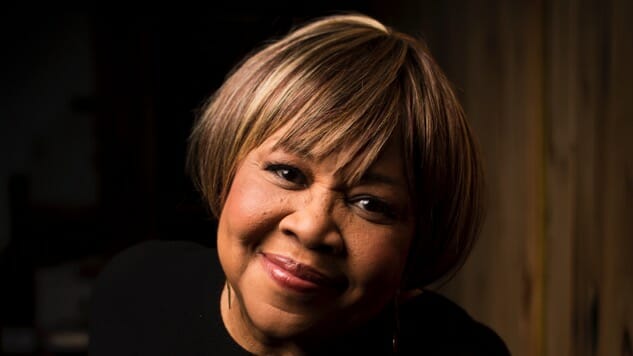Mavis Staples: Lifting Up the World with a High Note

The writer George Eliot once wisely noted that, “The last thing we learn in life is other people’s perceptions of us.” But Mavis Staples is lucky—she’s getting to discover what her peers truly think of her long before that. And she has been suitably flabbergasted.
At 76, the Grammy-winning gospel/R&B vet is releasing her 14th solo album—her 42nd record overall, when you include the catalog of her former family band, The Staple Singers. And Livin’ On a High Note is a collection of soulful songs produced by M. Ward and composed exclusively for her, by longtime fans like Ben Harper (“Love and Trust”), Benjamin Booker (“Take Us Back”), Neko Case (“History Now”), Nick Cave (“Jesus Lay Down Beside Me”) and Ward himself (“Don’t Cry,” a collaboration with Bon Iver’s Justin Vernon called “Dedicated,” and a bluesy “MLK Song,” his lyrical synthesis of particularly moving Martin Luther King, Jr. speech passages). Other artists that were honored to contribute: Aloe Blacc, tUnE-yArDs, Valerie June, The Head & the Heart and Son Little, with whom Staples had already worked on last year’s Your Good Fortune EP, which just earned her a Grammy for its classic cover “See That My Grave is Kept Clean” in the Best American Roots Performance category.
Add to this the new documentary film from director Jessica Edwards, Mavis!—which celebrates the remarkable career of Staples, one that started when the woodsy-throated Chicagoan was only 16, backed on guitar by her father Roebuck “Pops” Staples, and belting out the religious standard “Uncloudy Day”—and you’ve got a full-blown renaissance. (A young Bob Dylan, in fact, was so moved by that song that he became fascinated—then friends—with The Staple Singers, and even proposed marriage to the frontwoman at one point in the early ‘60s, an offer she sometimes regrets declining.) She was moved to tears the first time she viewed the final cut of the movie. And yes, she says, it has been a truly heartwarming experience to find out just how much people love you, hopefully years before it’s your time to go.
“At my age and who I am? It feels great, it feels like a rebirth,” observes Staples, who issued her first eponymous solo set in 1969, then switched to secular sounds in the ‘70s with chart-topping Staple Singers hits like “I’ll Take You There” and “Let’s Do It Again.” “But I just can’t stop—even if I tried to retire, I just can’t stop, because people keep constantly bringing me good news. I never thought I’d be going this long, and that things would still be happening for me. Like this new record—all of these wonderful songwriters being so happy to write for me, to write me a song. I’m on cloud nine.” And she suddenly breaks into the rousing chorus of June’s toe-tapping “High Note” anthem: “I’m livin’ on a hiiiiigh note! I’ll tell you, there just doesn’t seem to be any stopping!”
Truth be told, the grande dame was prepared to take her curtain call this year. She felt like she had pretty much done it all. After The Staple Singers’ close association with the civil rights movement in the ‘60s (and friendship with Dr. King), she had been championed by such stellar supporters as Prince (who penned two entire albums for her, ‘89’s Time Waits For No One and The Voice in ’93), Ry Cooder (who produced her 2007 bow, We’ll Never Turn Back) and Wilco’s Jeff Tweedy (who oversaw two Anti- efforts, 2010’s Grammy-winning You Are Not Alone and its 2013 followup, One True Vine). After her four-cut teaming with neo-soul stylist Little last year, she had no idea what to do next. “It didn’t dawn on me that the label would want another record out of me,” she recalls. “So my head was focused on coming home and sitting down. But no. It was not in the plan. Not in my plan, not in God’s plan, because everything that happens for me is His doing. God has a hand in it, you know, and He gave me this voice. So it’s meant for me to continue and carry good news to people.”
Anti- Records exec Andy Kaulkin had a little to do with it, as well. He and Staples’ manager came up with the multiple-composer concept, and proposed it to her one day at Your Good Fortune tour rehearsals in Los Angeles. Initially, the idea barely registered, she says, laughing. “I was like, ‘Wow! I’m getting another record?’ But then I thought it would be interesting, and it would probably be a great challenge for me. So I started giving them names, and Valerie June was always asking me, ‘Mavis, can I write you something?’ So I was like, ‘Yeah, Valerie! Write me a song!’” Next thing she knew, Kaulkin was phoning her in her hotel room one morning, inviting her downstairs to breakfast. When she got out of the elevator, there was June, waiting for her; she had flown in just to start work early with her idol. “And I’m going to have to start doing what Valerie does,” Staples adds of that summit. “She ordered egg whites that day, and I said, ‘My God—what are egg whites?’ And she said, ‘You don’t eat egg whites? They’re amazing, and the best way to eat eggs!’”
-

-

-

-

-

-

-

-

-

-

-

-

-

-

-

-

-

-

-

-

-

-

-

-

-

-

-

-

-

-

-

-

-

-

-

-

-

-

-

-








































